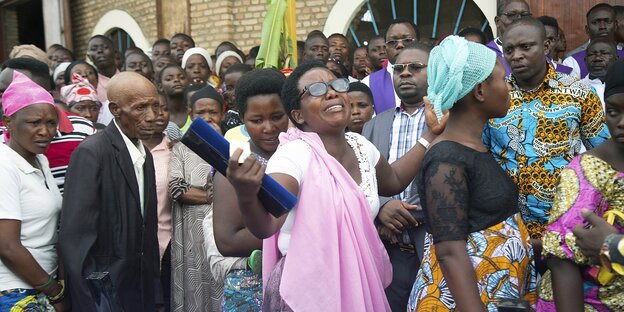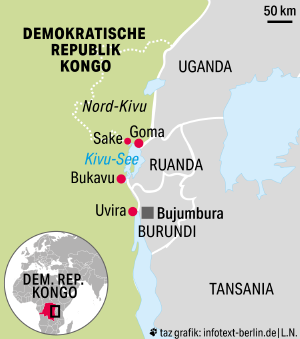In eastern Democratic Republic of the Congo, Burundian soldiers fight Rwanda-backed M23 rebels. Frustration is growing in Burundi.

Rwanda accused: Burial of victims of rebel attack in Burundi, December 26 Photo: Berthier Mugiraneza/ap
KAMPALA taz | There is usually a lot of activity at the border crossings between Burundi and neighboring Rwanda: traders and farmers bring their products to the other country; Students from the border region go to school on the other side; Families visit relatives; The trucks transport imported goods such as gasoline.
But the border crossings have been closed since mid-January. Only the soldiers stand firm by the barriers. There is another crisis between Rwanda and Burundi.
The reason: Burundian rebels from the group based in the east of the Democratic Republic of the Congo RED Tabara (“Resistance for the Rule of Law”) invaded Burundi shortly before Christmas and carried out a massacre northwest of the capital, Bujumbura, in which more than 20 people, including children, died. Burundian President Evariste Ndayishimiye accused Rwanda of providing weapons and uniforms to the rebels, closed the border and deployed troops.
Escape after battles M23 rebels in the Democratic Republic of Congo advanced last week to the outskirts of the town of Sake on Lake Kivu. According to the UN, 135,000 people from Sake and its surrounding areas fled to the provincial capital, Goma, 25 kilometers away, and which has about a million inhabitants. In total, around 700,000 people are fleeing in the conflict region.
Protests in the capital Since Saturday, young people have been protesting daily in the center of Kinshasa, the capital of Congo, against alleged international complicity with the M23 rebels. UN vehicles were set on fire and fires were set in front of the embassies of Western countries. Protests broke out again on Monday.
In the east of the Democratic Republic of the Congo, Rwandan and Burundian soldiers are now facing each other directly on the front lines. According to UN conclusions, Rwanda supports the Tutsi-led coalition with special forces The rebel movement M23 (March 23 Movement), which is currently on the rise again around Goma, the provincial capital of eastern Congo, right on the border with Rwanda. Last week, thousands of residents from the surrounding area fled to the city of more than a million people after fighting broke out again in the mountains about 30 kilometers west of Goma.
M23 rebels hold Burundian prisoners of war
To push back the M23 rebels, the Congolese government has hired Burundian soldiers. Apparently they pay them with minerals. To do this, they are now fighting with the Congolese army against the M23, that is, indirectly against Rwanda. Last week, Burundian soldiers heading to Goma were ambushed by the M23, killing dozens of people. The M23 rebels publish names and photographs of fallen soldiers in Burundi almost daily. A week ago she explained Rebel Coalition AFC (Congo River Alliance), of which M23 is a prominent member, which also holds prisoners of war from Burundi.
“They feel abandoned by their commander in chief,” he said. Burundian soldiers were deployed without their mobile phones so they could not contact their families at home. These messages are part of the M23's psychological warfare. Its objective is to create discontent against the government of Burundi.

Serious economic crisis in Burundi
There are enough reasons for frustration in Burundi. For more than two years, in the small country of about 13 million inhabitants there has been an extreme shortage of gasoline due to the lack of foreign currency. Gas stations now only give 20 liters per customer, if anything.
The economy is suffering enormously, the prices of even basic foodstuffs have multiplied. “I can hardly feed my children anymore, they will soon die of hunger,” complains a woman in the central market of Bujumbura to the Burundian media platform “SOS Médias Burundi”.
“I can hardly feed my children anymore, they will soon die of hunger”
The closure of the border with Rwanda is driving up prices in Burundi. Merchants and motorcycle taxis have expressed their frustration during the violent protests at gas stations. Police and members of Imbonerakure, the youth militia of Burundi's ruling party CNDD-FDD (National Committee/Forces for the Defense of Democracy), violently dispersed the protests. According to the Burundians ITEKA human rights organization State violence is increasing: extrajudicial executions, targeted killings, forced disappearances, torture and sexual violence, and arbitrary detentions.
At the same time, this year's long rainy season is proving especially difficult for Burundian farmers. Heavy rains have delayed sowing and washed away the seeds. The massive Lake Tanganyika, along the border with the Democratic Republic of the Congo, has extremely high water levels and is destroying homes and farmland along its banks.